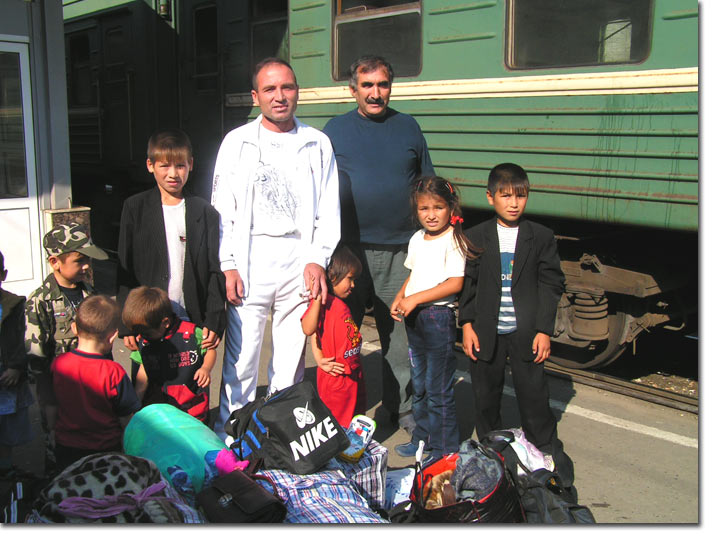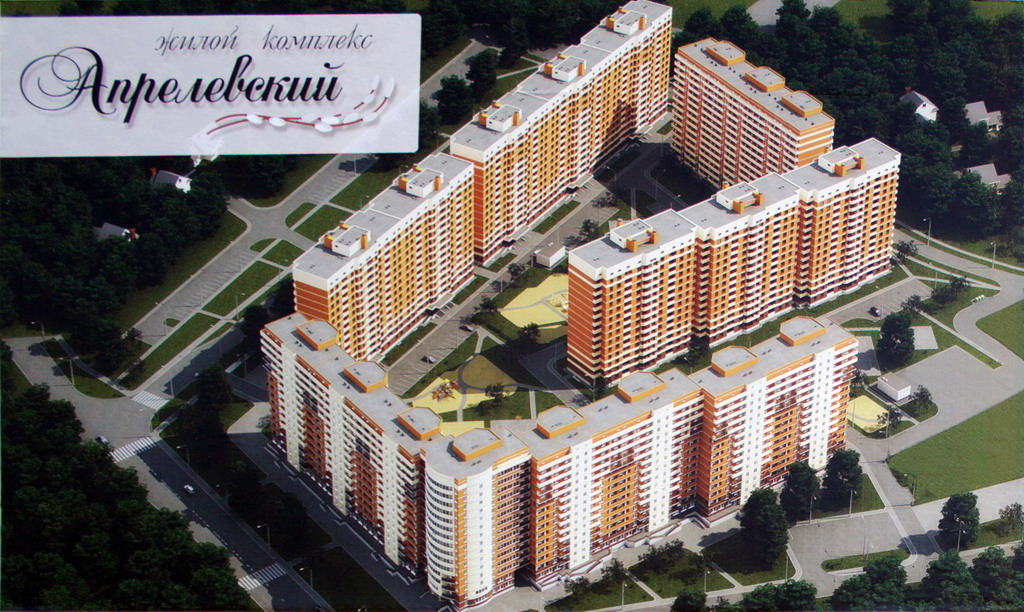Prapor
Active member
http://www.guardian.co.uk/world/2011/jul/14/moscow-double-size-overcrowding

I own a dacha (cottage/summer vacation house) near Aprelevka. So, for me, this is a very good thing.

Funny though, they are planning to build massive new high-rise apartment complexes near, or perhaps even on the 'aeration fields' at Lyubertsy. This is a gigantic sewage plant. To put it quite simple, all the sh*t from the Megapolis goes there, every time somebody in Moscow flushes down a toilet, to Lyubertsy it goes. No wonder they hate us all lol Who'd want to live in those apartments I wonder? The smell alone would drive you crazy, and add the noise from the machinery...
Other things. It is true, while the country is only now has stopped the decline in the population, due to large emigration and, for awhile, historically high death rates (and in 2010 there was a small drop again, due to another large wave of people living the country); Moscow has been growing steadily.

While Moscow

And by the way, that only takes into account the legal residents. There are about 2,000,000 illegal immigrants here too.
But there are a number of factors for the growth
A. Immigration, people from all over Russia, former Soviet Union




and more recently even beyond (lots of Chinese, Vietnamese, and Koreans have come to work in Asian restaurants and street markets; and many rich people employ Filipino maids and nannies now, as they are thought to be hardworking and attentive, plus they speak English and can tutor the children in the language, and also, they charge less than Russian women or even Ukrainian girls, who traditionally fulfilled such roles. Some 50,000 girls from the Philippines live and work in Moscow now, in wealthy families, cleaning, cooking, caring for children and elderly)

and
B. Birth rates have also gone up since 2004. Then-mayor Yuri Luzhkov instituted a bonus allowance to mothers (about US$10,000), combined with Federal Maternity Capital (another US$10,000). This seemed to have worked.

In 2000, birth rate in the capital was 8 births per 1000 people. Today it is approaching 12. Moscow's biggest family, that of Nikolai and Tatyana Saltykov

8 sons, 9 daughters. Oldest, Maxim, 30, lives separately, and himself is married with 3 children.
All this is, indeed, creating overcrowding and discomfort. So, they are expanding the city. Which is great for people who own property on the lands the city is taking, as those of them who rent the houses or apartments out can now charge twice as much, as such is the difference between price on property in the city and in the oblast. But, the environmentalists are worried, understandably. With all the dacha building and what, and all the development around the capital, forests are being destroyed, animal habitats, lakes and rivers polluted.
This

was a quiet little village once upon a time...
I don't know what's going to happen. Hope for the best.
Map of expansionMoscow to double in geographical size to ease overcrowding
Russia reveals plan for capital to absorb woodland and holiday towns but critics warn of impending environmental disaster
Russian officials have announced plans to more than double Moscow's territory in a bid to alleviate the city's crippling traffic and overcrowding, but critics worry the move could prove to be an environmental fiasco and leave thousands displaced.
The plan to increase Moscow's size from the current 264,000 acres to 620,000 acres was given initial approval on Monday by Dmitry Medvedev, Russia's president, in a meeting with the city's mayor, Sergei Sobyanin, and Boris Gromov, governor of the surrounding Moscow region. The plan will see Moscow expanding to the south and south-west, taking in forestland, small communities and dachas or summerhouses.
It foresees much of the heart of Moscow – its government offices and big businesses – moving to the new neighbourhood, forever changing the spirit of the city's historic centre.
The first to move are due to be the offices of the prime minister and cabinet, as well as the presidential administration, Sobyanin said in a meeting with the editors of Russia's leading newspapers this week. Russian officials are looking at a 20-year timeline to complete the city's growth. They have yet to announce a budget for the venture.
The move is Moscow's boldest attempt yet to deal with the notorious bottlenecks that often bring movement in the city to a standstill. It is part of Medvedev's vision to turn Moscow into a global financial centre as the country seeks to attract investment and boost its international standing. He first floated the expansion idea during a speech to foreign investors during an international forum in St Petersburg last month.
The plan, published on the Moscow city government website, says the city's southern and south-western outskirts were chosen in part because they comprise "a relatively weakly urbanised sector of the Moscow region," counting some 250,000 people.
Alexei Yaroshenko, of Greenpeace Russia, said he believed the number was much higher. It also does not include those who maintain dachas in the region. "We don't know the exact borders yet," Yaroshenko said. "If it is moved this way or that, hundreds of thousands of people will be added."
The concern comes from precedent – locals in and around the Black Sea resort of Sochi, the site of the Winter Olympics, have protested over forced relocation as the government takes over prime real estate in the region.
Five years ago residents of Butovo, a village on the outskirts of southern Moscow, had a face off with authorities for weeks as they attempted to fight the razing of houses to make way for construction. Residents of Khimki, in northern Moscow, continue to battle controversial plans to build a road through their forest.
"They don't care at all about the people," Yaroshenko said. "The officials decide and then start to build and what people think makes no difference to them." He worried that the lush forestland in the region would be the first affected, since it is federal property.
Yet even critics like Yaroshenko admit something has to be done. Moscow's population has grown by 200,000 a year since 2002, he noted, citing census results.
Aside from the potential effects on residents and the forests that line Moscow's southern outskirts, Yaroshenko worries that the expansion – which city officials say will add housing for 2 million Muscovites and more than 1m jobs – will only increase Moscow's dominance over the country.
While preliminary results from a 2010 census showed that the overall population of the country decreased by 1.2%, Moscow's population increased from 10.4 million to 11.5 million.
"The country is emptying and Moscow is growing," he said. "All resources are going to Moscow – first money and then people follow."

I own a dacha (cottage/summer vacation house) near Aprelevka. So, for me, this is a very good thing.

Funny though, they are planning to build massive new high-rise apartment complexes near, or perhaps even on the 'aeration fields' at Lyubertsy. This is a gigantic sewage plant. To put it quite simple, all the sh*t from the Megapolis goes there, every time somebody in Moscow flushes down a toilet, to Lyubertsy it goes. No wonder they hate us all lol Who'd want to live in those apartments I wonder? The smell alone would drive you crazy, and add the noise from the machinery...
Other things. It is true, while the country is only now has stopped the decline in the population, due to large emigration and, for awhile, historically high death rates (and in 2010 there was a small drop again, due to another large wave of people living the country); Moscow has been growing steadily.
While Moscow

And by the way, that only takes into account the legal residents. There are about 2,000,000 illegal immigrants here too.
But there are a number of factors for the growth
A. Immigration, people from all over Russia, former Soviet Union




and more recently even beyond (lots of Chinese, Vietnamese, and Koreans have come to work in Asian restaurants and street markets; and many rich people employ Filipino maids and nannies now, as they are thought to be hardworking and attentive, plus they speak English and can tutor the children in the language, and also, they charge less than Russian women or even Ukrainian girls, who traditionally fulfilled such roles. Some 50,000 girls from the Philippines live and work in Moscow now, in wealthy families, cleaning, cooking, caring for children and elderly)

and
B. Birth rates have also gone up since 2004. Then-mayor Yuri Luzhkov instituted a bonus allowance to mothers (about US$10,000), combined with Federal Maternity Capital (another US$10,000). This seemed to have worked.

In 2000, birth rate in the capital was 8 births per 1000 people. Today it is approaching 12. Moscow's biggest family, that of Nikolai and Tatyana Saltykov

8 sons, 9 daughters. Oldest, Maxim, 30, lives separately, and himself is married with 3 children.
All this is, indeed, creating overcrowding and discomfort. So, they are expanding the city. Which is great for people who own property on the lands the city is taking, as those of them who rent the houses or apartments out can now charge twice as much, as such is the difference between price on property in the city and in the oblast. But, the environmentalists are worried, understandably. With all the dacha building and what, and all the development around the capital, forests are being destroyed, animal habitats, lakes and rivers polluted.
This

was a quiet little village once upon a time...
I don't know what's going to happen. Hope for the best.
Last edited:
